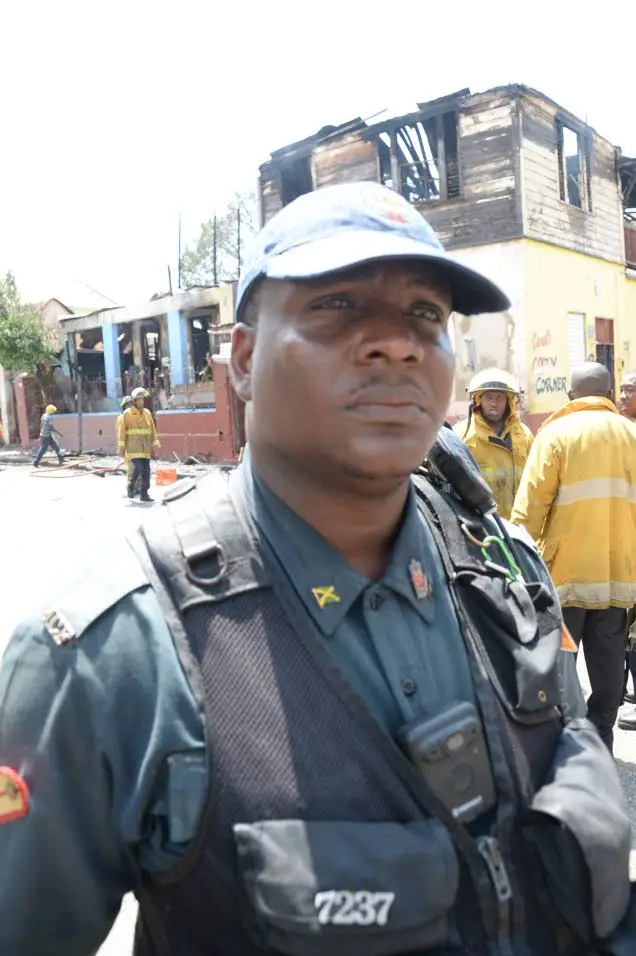
1,000 body cams coming, says Blake
Billions in tech upgrades pave way for use; legislative changes needed to roll out other measures
MONTEGO BAY, St James — Billions in tech upgrades have paved the way for effective use of body-worn cameras by members of the Jamaica Constabulary Force (JCF).
Also, the technology is now also available to electronically nab motorists who run red lights, but legislative changes are needed to roll that out.
The updates were among those provided by Police Commissioner Dr Kevin Blake during Wednesday evening’s monthly meeting of the Montego Bay Chamber of Commerce and Industry (MBCCI).
The country’s top cop, who said 1,000 body cams are on order, conceded that there had been some missteps when the JCF first attempted to have cops wear the equipment while engaging with the public.
“When we started first we made a mistake. We just pin some body-worn cameras on persons and have some computers where we download and things like that. That’s a nightmare. We disperse videos across various different computers and if one of those goes down, you lose everything. When it is needed for court you hear that, ‘Boy, police had it and they destroy it, so a must corruption,’ “ he explained.
Blake said that despite public clamour for body-worn cameras to be widely used, the JCF took a decision to move strategically in order to get the best results.
“If we were taking a knee-jerk approach, then we would abandon what is right and buy a lot of body-worn cameras. Pinning a body-worn camera on a policeman is the easy part. Buying and pinning it is the easy part. Building the infrastructure to manage that data, building the procedure, the policies around it and all of that is the difficult part and that’s what we have been doing all along,” he said.
The police commissioner said the last two to three years had been spent building out the backend of their operations and expanding their network. With additional capital spending in this financial year, Blake said, a total of $7 billion will be dedicated to these upgrades.
“Now that we have the infrastructure, we have restarted procuring body-worn cameras,” added Blake.
He told the business leaders that the cameras will be able to live stream video recordings.
Blake’s comments came in response to MBCCI secretary and attorney-at-law Chumu Paris’s concerns.
“I’ve never seen an officer with the body cam. [I] just want to get an idea of what is your commitment to seeing to it that JCF members are equipped…with radio connectivity and not relying on a cellphone and also [equipped] in relation to body cams, particularly those who are going on these tactical operations,” Paris said.
In his response, Blake stressed that the JCF has long recognised that it is in their members’ best interest to wear body cameras and the force had been at the forefront of the effort.
“Nobody imposed body camera on us. We really undertook implementation of body-worn cameras. And we did it — not for the reason that many persons I hear talking about body cam [are saying] we did it. We always tell our police officers, ‘When you’re out there working and you don’t have a camera, you may be the only one not videoing the incident from your perspective.’ And so we do that, not just for the integrity but more so for the protection of our officers,” the commissioned argued.
Blake also told members of the St James business community that the JCF has the technology to electronically ticket motorists who run red lights; however, the police are awaiting corresponding legislation that will allow them to take photos of offenders and electronically issue tickets that “reach your home before you”.
“We have all of that technology and that capability. The challenge we have is the legislation, and that is being addressed. Because they can do that, because the liabilities are the owner of the vehicle, not on the driver,” he explained.
“If you have a motor vehicle in the US and someone else is driving it and it runs a red light, you are the one getting the ticket. It goes to your house and if you don’t pay it, it’s your licence get suspended, right? Our laws are not like that, and so as soon as it is in place [we can act],” he added.
Turning his attention to other technological improvements, Blake revealed that the police now boast a system which enables the monitoring of individuals who are out on bail.
“That is now automated, so we don’t have to be skirting through a register anymore. If you are supposed to report on condition [of bail] and you haven’t reported, then we will know, and so we can take action,” Blake said.
























